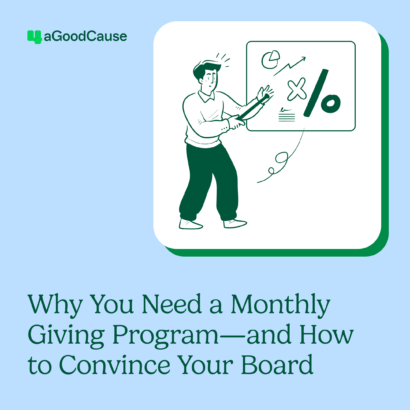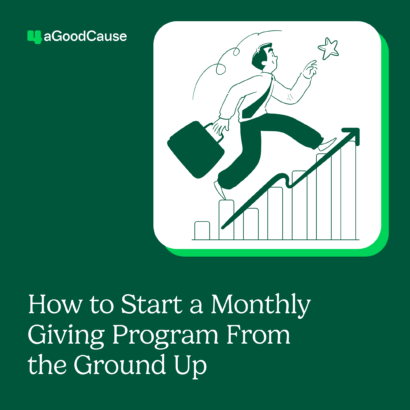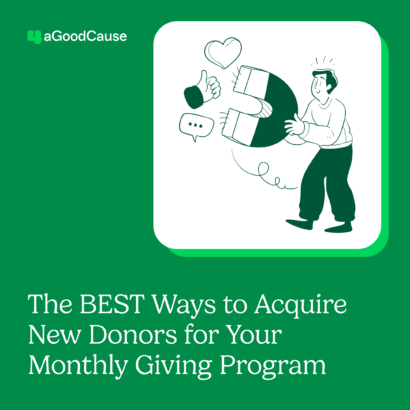Julia Campbell—author, speaker and marketing strategist—is passionate about helping nonprofits understand how their marketing plans can impact fundraising. 4aGoodCause spoke with her about how nonprofits’ use of social media to tell stories can translate to increased donations.
Q: What is your career background?
A: I studied journalism at Boston University, fully expecting to become a magazine journalist and work at Rolling Stone, living a glamorous life of interviewing celebrities and political figures. Then, based on my love of travel and desire to explore the world, I decided to serve in the Peace Corps, spending 2.5 years in West Africa as a health center volunteer. That’s when my life trajectory changed. I had always volunteered for and fundraised for various causes and political campaigns, and I knew that I could never work for a company that was not involved in making the world a better place in some way. So when I got home, I focused on nonprofit work.
My strengths having always been in outreach, public speaking, and communications, and those translated well into development and marketing positions. I was a one-woman development and marketing shop for years at a small nonprofit in Virginia, and I also worked as development/marketing director for larger organizations.
I even got my masters in public administration, expecting to become an executive director and found my own nonprofit one day! Things changed when I had my daughter, and I decided to go off on my own.
Being self-employed certainly has its ups and downs, but I wouldn’t trade in this career for anything – I have the good fortune to work with so many different causes, missions, people, and projects. Never a dull moment!
Q: How did you become a marketing expert?
A: Some people don’t like the word expert, but I do feel that my experience working in a variety of nonprofits as a development and marketing director has helped me gain expertise. I also attend conferences, listen to podcasts, read a lot of books, and engage in conversations with nonprofits doing this work every single day.
When I started my business, I focused on freelance grant writing, because that is a strength of mine – critical thinking and great copywriting. That evolved into helping organizations become more strategic in all of their communications efforts. I now consult with organizations in the planning and launching of online fundraising campaigns and social media marketing plans that work.
I think an expert is always willing to learn new things and be open to new and creative ideas, and in marketing, things are always changing. I’m certainly being kept on my toes, especially in the world of social media!
Q: What inspired you to help nonprofits get the most out of their marketing strategy?
A: Nonprofits get such a bad reputation for being stuck in the dark ages when it comes to marketing. They are often terrified of offending anyone, or thinking outside the box, or leaving the status quo – “this is how we’ve always done it.”
Of course, there are some stand out charities that do amazing marketing campaigns – think charity:water, the ASPCA – but the small ones often feel overwhelmed and underprepared. The people who generally work at nonprofits do not come from journalism, writing, marketing, and PR backgrounds – they are social workers or volunteers who made it up the ranks to staff.
I am also incredibly passionate about telling nonprofits that they do NOT have to jump on every shiny new platform that arises – less is always more, and focusing their efforts on just a few channels works so much better than spreading themselves too thin.
Another reason that I focus on nonprofits is that despite their budget constraints, they always have wonderful stories to tell and passionate people who rally around them and want to see them succeed. When a nonprofit truly connects with its tribe, tells inspiring stories, and hits its marketing stride, it’s a wonderful thing to see.
Q: Why should nonprofits make their social media strategy a priority?
A: There is no one size fits all answer to this question. Social media can certainly be a powerful tool for spreading ideas, engaging community members, and raising money – when done well. However, I would encourage small nonprofits just starting out to focus on improving their websites and building their email lists first.
Social media is exciting and sexy, but you have absolutely no control over these platforms. They are the icing on the digital marketing cake. Bake a sturdy cake first by having a great website with a laser-focused call to action, build your email list and engage your donors with stories, then use social media to continue to solidify existing relationships as well as bring new people into the fold.
If your nonprofit is using social media, you do want to focus on creating a cohesive strategy, one that focuses on my two pillars of content – becoming a go-to resource and sharing impact stories.
Q: Is there anything you commonly see nonprofits doing WRONG on social media? What changes would you suggest they make?
A: I see so many nonprofits only thinking about what social media can do for THEM – How can I promote my events using Facebook? How can I get more people to read my blog using Twitter? How can we get more donations with Instagram? This kind of thinking needs to be turned on it’s head.
Nonprofit social media strategy should be focused on creating value for the audience – becoming a go-to resource, sharing helpful and educational information, being entertaining, and showcasing impact that donors want to see. Not a single one of your stakeholders is on social media to read about the new award you received or the Board retreat.
Expectations of what social media can do also need to be checked. It’s not a spigot that you can turn on and off when you want donations. As we have seen in recent weeks, Facebook et al do not have the best interests of your nonprofit at the heart of what they do. You need to be strategically using these channels to establish trust and build brand affinity, so that when you do a thoughtful, well-planned fundraising campaign, people will respond.
Q: Why are stories about impact important for nonprofits to tell? How do they affect donors?
A: Donors want to know two things from nonprofits: 1) What did you do with my money? 2) Did it make an impactful difference on a problem that I care about? This is a main factor leading to shamefully low donor retention percentages. Nonprofits tend to only give donors information that the nonprofit wants them to hear – not the stories that the donor is interested in.
Nonprofits need to prioritize good storytelling in order to change minds, grab attention, and deepen relationships.
Q: How do visual elements (photo and video) impact storytelling?
A: Being on social media requires piquing interest and grabbing attention. Any successful marketing campaign will have visuals front and center. Study after study has shown that social media users engage with video more than any other type of content. Incorporating authentic visuals into your storytelling campaigns makes them more vibrant and more likely to be shared.
The good news it that there are so many free and low-cost tools out there to create visuals to accompany your storytelling efforts! I have a resource for nonprofits, Battle-Tested Tools to Rock Your Digital Storytelling, as well as a Pinterest board where I collect the best articles on visual marketing and DIY graphic design/video production.
Q: How does great marketing better help nonprofits tell their story?
A: Great marketing really gets into the “Why would anyone care?” question that all nonprofits must grapple with. Yes, we know we do fantastic, world-changing work. But can we convey this message in a way that will resonate with complete strangers?
The goal of any marketing campaign should be to bring as many new people into our orbit as possible – the RIGHT people, people that will actually be interested and have the potential to be longtime donors. After we entice their curiosity with great marketing campaigns, after we have built trust with them and showcased our impact and made our case for giving, THEN we can ask them to support us. That’s fundraising. I believe they are inherently different.
Q: Whose stories should nonprofits be telling? (Their own, their donors, their employees/volunteers, the people they help?)
A: The story that your nonprofit should be telling is based on the goal that you want to achieve. If your goal is marketing and getting in front of new people, then you may have to tell a provocative, shocking story that will grab attention. If your goal is recruiting volunteers, tell the story of a volunteer whose life was changed by working at your organizations. If your goal is fundraising, showcase a story that makes the case for giving – why give to us and why now? I think collecting, crafting, and sharing a multitude of stories about the diverse tapestry of people that support your work and contribute to it is the best long term storytelling strategy.
I offer a free e-book on this very topic, providing guidance on the 6 types of stories that your nonprofit should be telling.
Q: How can nonprofits use all their social channels to tell a cohesive story?
A: All storytelling should be done with a goal in mind. What do you hope to achieve with this story? Is it to build trust leading up to an online fundraising campaign? Is it to thank donors for their gifts? Is it to share the impact that you have made, and change people’s minds about misconceptions and stereotypes that they may have about the population you serve? Determine your goals first, then list out the types of stories that you need to tell to help you accomplish those goals.
Stories can be re-purposed in many different ways across channels. For example, if you do a Facebook Live interview or Q&A with a client or staff member, you can then download that video file, embed it into your blog and website, share it on Twitter and Instagram, and link to it in an email newsletter. There are so many ways to get your story out there!



